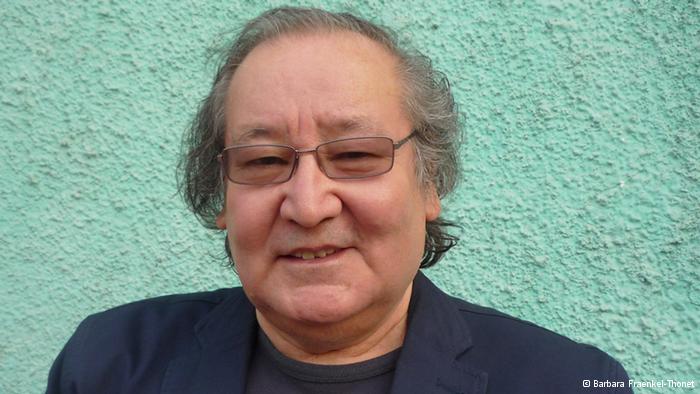
Kazakh Theater Director Bolat Atabayev Released as Opposition Leaders Await Trial
Publication: Eurasia Daily Monitor Volume: 9 Issue: 132
By:

The trials over the December 2011 violence in Zhanaozen are approaching their most dramatic phase. Several political opposition leaders are facing charges ranging from inciting public discord to calling for the violent overthrow of the government and establishing an organized criminal group. In January, Kazakhstan’s Prosecutor General, Askhat Daulbayev, stated that one of the reasons for the riots in Zhanaozen was the actions of individuals who convinced the fired oil workers to continue protesting and to confront the authorities (zakon.kz, January 25).
Prominent theater director Bolat Atabayev was released from arrest on July 3, while a number of political activists are being held in detention awaiting trial for their alleged role in the Zhanaozen events. Among them are Vladimir Kozlov, leader of the unregistered “Alga!” (Forward!) party; Serik Sapargali, a politician and activist of the Khalyk Maydany (People’s Front); trade union organizer Akzhanat Aminov; and youth leader Zhanbolat Mamay. In January, Kozlov and Spargali were arrested in Almaty and subsequently transferred on May 15 to Aktau where the trial will take place.
The prosecutors initially accused them of inciting public discord (Article 164 of the Criminal Code), but on June 26 they brought more serious criminal charges: Kozlov, Sapargali and Mamay were charged with calling for the violent overthrow of the government or a change of the constitutional order (Article 170), said Kozlov’s wife Aliya Turusbekova (IA Novosti-Kazakhstan, June 27). If convicted, they face prison sentences of up to 12 years. Kozlov may serve a prison sentence of up to 19 years as he was also accused under Article 235 of establishing and leading an organized criminal group with two Kazakhs living abroad – “Alga!” activist Muratbek Ketebayev and the fugitive Kazakh banker Mukhtar Ablyazov, who resides in the United Kingdom.
Former BTA Bank manager Mukhtar Ablyazov has evaded the UK’s justice system after being sentenced on February 16 to 22 months in jail for contempt of court in failing to provide information about his assets. His whereabouts are unknown, but Kazakhstani authorities claim to have evidence that he financed the oil strike through the political opposition. Ablyazov denies any involvement in the Zhanaozen labor dispute. However, two years ago, opposition leaders admitted that he had provided funding for their organizations (IA Novosti-Kazakhstan, June 27; see EDM, February 27).
Kazakhstani opposition politicians and public figures have requested to be present at the interrogation of opposition activists accused of inciting public discord, which led to the Zhanaozen riots. The request is based on the precedent the National Security Committee (NSC) set by allowing film director Yermek Tursunov access to files of criminal proceedings brought against his colleague Bolat Atabayev. Tursunov’s intervention and international involvement secured the release of Atabayev on July 3 from the detention center in Aktau, the administrative center of Kazakhstan’s Mangistau region (Interfax-Kazakhstan, July 10).
The case of Bolat Atabayev demonstrated that the trials of political opposition leaders are extremely sensitive and will be monitored by the international community. Atabayev was accused of giving an inflammatory speech to striking oil workers in Zhanaozen, just before the riots in December 2011 that resulted in 16 deaths. He was briefly detained in January 2012, but released on bail with restrictions on travel. On June 14, the NSC arrested Atabayev together with youth leader Zhanbolat Mamay after neither had appeared in May for official questioning about the alleged incitement of social discord. Atabayev vowed not to cooperate with the investigation in protest of the jail sentences handed out to rioting oil workers by the court in Aktau in June (IA Novosti-Kazakhstan, July 4; see EDM, June 8).
The 60-year old theater director was released on July 3, following a strong reaction from Germany, along with several international human rights groups and Oscar-winning German filmmaker Volker Schlondorff. German Human Rights Commissioner Markus Loning said that Atabayev simply made use of his right to freedom of opinion, and Kazakhstan needs to honor its commitments to OSCE principles (UPI, June 26; Screen Daily, June 17). Atabayev’s theater work has focused on the plight of the German minority in Kazakhstan, and he was awarded the Goethe Medal for 2012 – an official decoration of the Federal Republic of Germany given to foreigners “who have performed outstanding service for the German language and international cultural understanding. Germany is a strategic partner of Kazakhstan, most recently in the extraction of rare earth minerals (see EDM, February 14).
Upon release, all charges against Atabayev, including “inciting social discord” and “calls for the violent overthrow of the government” were dropped; he now has the status of a witness (Interfax-Kazakhstan, July 4). The leader of the opposition youth movement Ruh Pen Til (Spirit and Language), Zhanbolat Mamay, is still in detention in Aktau, despite expectations that he would be released together with Atabayev.
The political opposition sees the trial as an attempt by the government to eliminate any opponents (Respublika, June 15). The government perceives the opposition as being hijacked by ambitious oligarchs with personal grudges against the government who reside outside Kazakhstan and are intent on destabilizing the largest Central Asian state. The two perceptions might prove to be equally accurate. The Kazakhstani government has been persistently denying registration to “Alga!” and other political groups, thus limiting political space for the emergence of a genuine opposition. Meanwhile, the opposition is supported by individuals who do not necessarily pursue democratic goals, but struggle for personal political gains.




